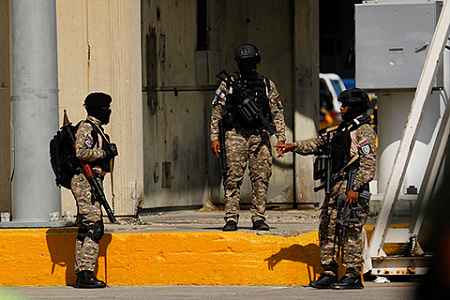
The recent capture by Venezuelan intelligence services of alleged mercenaries from Colombia and Trinidad and Tobago, who allegedly intended to attack government institutions, has caused an escalation of tensions between Caracas and Port of Spain. The problem arose when Venezuelan President Nicolas Maduro announced the arrest of a “group of armed terrorists” who allegedly tried to enter Venezuelan territory on a ship en route from Trinidad and Tobago.
Venezuelan Interior Minister Diosdado Cabello confirmed Maduro’s statements, announcing the detention of citizens of Trinidad and Tobago, “who were part of an armed terrorist group trying to enter Venezuela.” After the arrest of the “Trinidad mercenaries,” Caracas immediately brought charges against Port of Spain.
Trinidad and Tobago, a small English-speaking archipelago located about 10 miles off the coast of Venezuela, reacted very sharply to the accusations of Caracas. They led to the deterioration of previously warm relations between the two countries. The ties between them have so far allowed Venezuela to avoid a number of problems with its energy resources, as the two countries have collaborated on a number of projects, including the exploration and development of gas and oil fields.
Trinidad and Tobago’s Prime Minister Kamla Persad-Bissessar has denied her country’s involvement in the alleged invasion of Venezuelan territory by a terrorist group and promised to coordinate her position on Venezuela with US President Donald Trump.
At the same time, she announced that Venezuelan migrants staying in Trinidad should leave her country. Persad-Bissessar explained her decision to the recent increase in violence in the country associated with the presence of such Venezuelan criminal gangs as the infamous Tren de Aragua. Washington had previously recognized this gang as a terrorist group, banning most Venezuelans from entering the United States under this pretext. “The number of crimes in Trinidad and Tobago involving Venezuelans continues to grow,” the Trinidadian Prime minister said.
Caracas, referring to the data of the Ministry of Internal Affairs of Venezuela, however, continues to insist that among the terrorists who invaded Venezuelan territory, not only Colombian, but also Trinidadian mercenaries were identified, who allegedly confessed. In this regard, the Venezuelan side called on the leadership of Trinidad and Tobago not to succumb to Washington’s promises and not to play geopolitical games alien to the national interests of Port of Spain. To which the Trinidadian Prime Minister replied: “No amount of rhetoric from Caracas can drive a wedge into relations between Trinidad and Tobago and the United States, and Port of Spain supports Trump’s position on Venezuela.”
Meanwhile, Washington has revoked licenses that allowed Shell, BP and the National Gas Company of Trinidad and Tobago Limited (NGC) to cooperate with Venezuela on a number of projects as an exception to US energy sanctions against Caracas. Revocation of licenses means, among other things, the termination of any payments to Venezuela within the framework of joint projects with the participation of these companies.
These are projects for the development of the Manakin-Cocuina and Dragon fields located on the maritime borders between Venezuela and Trinidad and Tobago. In October 2023, the United States eased sanctions against Venezuela’s oil and gas sector, and in March 2024, the Venezuelan state-owned oil company PDVSA initiated cooperation with these companies.
It should be noted that for Trinidad and Tobago, as the largest exporter of liquefied natural gas (LNG) in Latin America, the issue of developing joint gas fields with Venezuela is also very important in terms of capacity utilization in this country. For Venezuela, these projects are seen as the only opportunity to monetize natural gas reserves and start exporting it to open up a much-needed new source of income.
Anyway, Persad-Bissessar warned that after Caracas threatened to carry out “raids against Colombian and Trinidadian terrorists,” her country’s territory was closed to Venezuela. Moreover, she declared Port of Spain’s readiness to use lethal weapons against the possible entry of Venezuelan warships into the territorial waters of her state.
“I want to make it clear to the Venezuelan government and officials that they can do whatever they want on Venezuelan territory, but I will not allow them to operate on Trinidadian territory,” Persad–Bissessar assured. “After the statements of Maduro and Cabello, we must take seriously the threat of Caracas to send its agents to our country to commit acts that could harm our well–being.”
The Ministry of Foreign Affairs of Venezuela, for its part, said that the “inadequate” reaction of Port of Spain raises serious suspicions of Trinidad and Tobago’s complicity in the alleged invasion of mercenaries on Venezuelan territory. As for Venezuela, it was emphasized that it “intends to pursue foreign terrorist gangs wherever they are.”
Having seen in such statements by Caracas a possible invasion of Trinidad and Tobago, Persad-Bissessar announced that she would recommend to the Minister of Defense to bring the Coast Guard to proper combat readiness.
